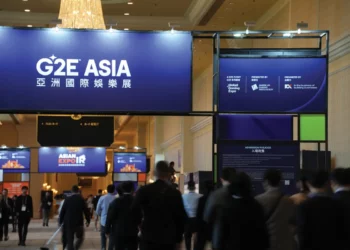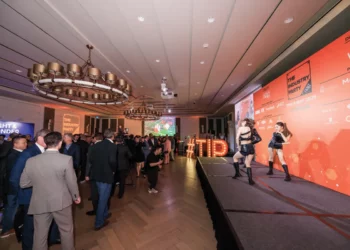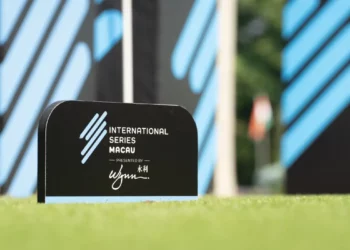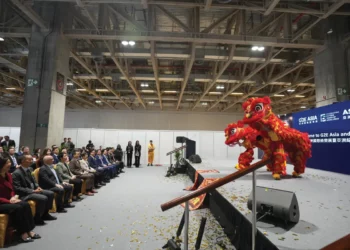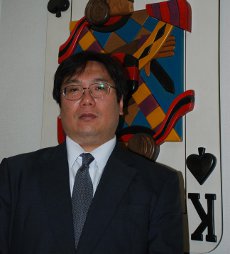 31 (35) Yasushi Shigeta
31 (35) Yasushi Shigeta
President and CEO
Angel Group
Under Yasushi Shigeta’s stewardship Angel Group has maintained and built on its precious reputation for quality control in the manufacturing of its gaming products. Angel Playing Cards are acknowledged in the Asian gaming industry for having the lowest failure rate of any product in that category.
Mr Shigeta’s professional background in management consultancy—he entered the sector after graduating with a degree in Information Science from Kyoto University in 1990—probably helped him keep an overview on quality-related issues when he joined Angel three years later. He worked his way up from middle management to become a director of Angel Group in 1995, finally being appointed to the top job in 2005.
Angel Playing Cards’ consistent quality helped Casino Angel pre-shuffled cards win the most nominations in the category of ‘Best Table Gaming Essential’ in Inside Asian Gaming’s Supplier Awards 2010 in March. Angel is in fact the pioneer of preshuffled cards and has been manufacturing them for over ten years.
Angel is dominant in the key Asian jurisdiction of Macau, where the company is estimated to have 90% of the market. The judges praised the quality of Angel’s pre-shuffled product, with one operator reporting an error free record of over 99.9%.
To give an idea of the high intensity of playing card usage in a baccarat-dominated market such as Macau, a casino operator with major properties in both Macau and Las Vegas said that its Macau casino goes through about as many decks in a month as its Vegas casino uses in an entire year. Apart from supplying playing cards, Angel also pioneered the electronic baccarat card shoe, which has been granted several patents in Macau, Australia the People’s Republic of China and the United States. The Angel Eye shoe is used on over 5,000 tables around the world, enabling big improvements in security and efficiency for casino operators.
Since its foundation in 1956, Angel has been dedicated to manufacturing all types of playing cards and gaming cards for domestic and international markets. The company started supplying major casinos in 1998. Angel, based in Kyoto, Japan, has 200 employees dedicated to producing high specification products, including packs tailor-made for individual operators and venues.
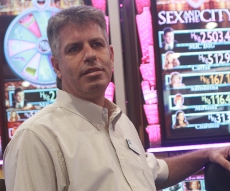 32 (32) John Gomes
32 (32) John Gomes
Managing Director
IGT Asia
IGT Asia, led by highly experienced gaming executive John Gomes, had its best ever year for regional sales, brand and product awareness, capturing a reported 25% market share for electronic gaming equipment at Singapore’s two new integrated casino resorts.
“This year has really been great for us. Customers once again are in purchase mode,” Mr Gomes told Inside Asian Gaming at G2E Asia in June.
The company has also been careful not to give product away for the sake of sales, instead preferring to build recognition of some of its premium slot products by player word of mouth via strategic placements in key venues across the region.
IGT premier video slot themes, including Wheel of Fortune®, Star Wars™, Indiana Jones™, Back to the Future™ and Alien vs. Predator™, have been installed at Genting’s Resorts World Sentosa (RWS) in Singapore. New premium product launches in 2010 include Sex in the City®, the slot game themed around the popular and longrunning HBO® television series, and Wheel of Fortune enhanced version complete with big screen (based on the popular syndicated television game show devised by Merv Griffin).
At RWS, IGT also installed IGT Advantage® SMS [slot management system], EZ Pay® and RFID Chip Inventory System (CIS). In Marina Bay Sands, Las Vegas Sands Corp’s resort, IGT installed IGT Advantage Table Manager. In August 2009, Mr Gomes was also responsible for the launch in Asia of IGT’s well received REELdepth™ games, which use Multi-Layer Display® technology to create 3-D virtual reels. The launch was at Resorts World at Manila, the largest casino in the Philippines and a joint venture between Star Cruises (now Genting Hong Kong) and a local developer.
Mr Gomes joined IGT in 2004 as General Manager for Russia with the responsibility of setting up and running the company’s business and offices in that emerging gaming market. Prior to his job with IGT in Russia, Mr Gomes worked for the biggest local gaming operator in that country. He has more than two decades of experience in gaming. He started his career with leading leisure group Sun International and as gaming was legalised in South Africa, Mr Gomes joined Tsogo Sun Gaming before relocating to Russia.
His knowledge of multiple international markets has served him well in the Asia Pacific region with its diverse markets and varied international clientèle. Players in the region often travel outside their home jurisdiction for their casino entertainment because of restrictions on domestic players even in markets where casino gaming has been legalised.
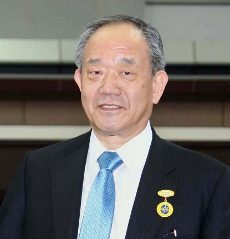 33 (18) Kenji Tsuchikawa
33 (18) Kenji Tsuchikawa
President and CEO
Japan Racing Association
Horse racing in the Asia Pacific region faces a number of structural challenges over the coming decade and the Japan market is equally affected.
Those challenges for Mr Tsuchikawa and his management team at the Japan Racing Association (JRA) include falling track side attendances, falling receipts and an ageing customer base, as the younger generation in Japan find other outlets (legal and illegal) for their gambling and gaming interests.
In 2009, the JRA’s average daily turnover declined to ¥9.0 billion (US$107 million), the lowest level since 1989. Average daily turnover peaked at ¥13.9 billion in 1997, and has been steadily declining ever since. Race attendance, meanwhile, peaked at 14.1 million in 1996, but by 2009 had almost halved to 7.3 million.
Horse racing receipts may also have been affected by the extension of legal casino gaming to neighbouring markets such as South Korea and Macau and could be affected further if Japan ever manages to legalise casino gaming in its domestic market.
A further pressure is faced by the JRA because unlike the horse racing government monopolies in Hong Kong and Singapore, the JRA has not been allowed to diversify into other products such as soccer betting and lotteries.
On the plus side, the JRA has been busy recently upgrading track facilities to re-brand racing as an entertainment and a day out, rather than as simply an outlet for hard gamblers. The latter image built up around the sport in the years after the Second World War. The changes include a two-year renovation of the Hakodate Racecourse in southern Hokkaido. The course had its gala relaunch in June this year.
Innovations at Hakodate include features to allow racegoers to inspect the horses in detail before each race. The pre-parade ring features a ‘dugout’ room enclosed by glass where the legs of the passing horses are at eye level with the fans. Unlike other tracks, where the horses disappear from view into tunnels leading onto the racetrack, at Hakodate, they walk from the pre-parade ring, pass close by the fans along a walkway and make their way onto the ‘stage’ of the racecourse.
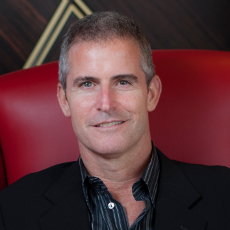 34 (-) Larry Mullin
34 (-) Larry Mullin
Casinos Division CEO
Tabcorp Holdings Ltd
Under Larry Mullin’s leadership, Tabcorp is committing major resources to attracting high rollers from Asia to play in its Australian casinos.
Tabcorp’s thinking is that the Asian high roller market is not a zero sum game. VIPs are highly mobile and like new opportunities to play when they travel on business. Some Asian high rollers have a son or daughter studying at an Australian university and like to combine a family visit with play in a casino, says Tabcorp.
By presenting Australian VIP play as complementary to play in Macau and Singapore, rather than competition to it, Tabcorp has persuaded junket agents to work in partnership with the Australian operator. It has deals with several of them. Tabcorp shares with the junkets some of its rolling commission earned on these top players when they visit Australia.
In Sydney, New South Wales, where Tabcorp operates the Star City Casino, tax rates on VIP table play massively undercut Macau (where the government creams off just under 40% of the gross) and compare very favourably with Singapore (12%, split between a 5% VIP rate and 7% Goods & Services Tax). In NSW, the gaming gross on overseas VIPs checking in a minimum of A$75,000 in the state’s casinos is taxed at just 10% (inclusive of GST). Tabcorp offers very competitive rebate programmes on a par with the rebates available to direct premium players at Resorts World Sentosa in Singapore. Tabcorp also operates three casinos in Queensland: Jupiters Hotel & Casino on the Gold Coast; Treasury Casino & Hotel in Brisbane and Jupiters Townsville in the north of the state. Queensland has its own gaming tax regime, with the same tax rate as in New South Wales (10%); however, the minimum check in to qualify is A$50,000.
In early September, Mr Mullin announced an ambitious new Tabcorp initiative to bring in even more Asian high rollers. Under the scheme, Star City plans to buy a A$100 million fleet of jet aircraft to bring in top players. James Packer’s Crown Casino in Melbourne is the only other Australian gaming property to do that.
In addition, Tabcorp is spending A$285 million on refurbishing the Star City property itself—including A$100 million on a 3,000- seat multi-purpose entertainment venue for major international acts, trade shows, exhibitions and conferences. The new venue will be ideal for televised events because of its spectacular backdrop overlooking downtown Sydney and Sydney Harbour.
Star City will also convert its own piece of harbour frontage into a wharf for the world’s biggest luxury cruisers to attract gambling whales to Sydney.
Mr Mullin is a former President and Chief Operating Officer of the Borgata Hotel Casino & Spa in Atlantic City, a joint venture (for the time being) between Boyd Gaming Corporation and MGM MIRAGE (now MGM Resorts International).
He started his casino career literally on the ground floor, working as a concierge, before climbing the ranks at Harrah’s. He also worked closely with Donald Trump during a 15-year career at various Trump resorts.
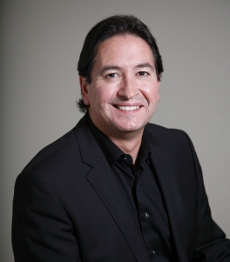 35 (-) Sebastian Salat
35 (-) Sebastian Salat
President
WMS International
The number of regular leisure slot players in Macau is on the rise, driving increased demand for a less volatile gaming experience. Leisure players generally view slots as a means to spend some time entertaining themselves—earning reward points and free F&B with their play. This new trend bodes well for WMS’s Sebastian Salat and his team, as WMS is a global leader in providing games that attract players with engaging entertainment experiences, combining gambling and entertainment to an unmatched level.
As Mr Salat reveals in an interview “WMS’ focus on ‘Player Driven Innovation™’ has demonstrated that regardless of region, players respond similarly to innovative play features and content that provides them with the best entertainment experience.”
WMS games offer unparalleled entertainment value, with high definition video effects and immersive sound. Last year, WMS introduced its Bluebird 2 cabinet to the Asian market, where it has gained popularity and generated increased floor share. At the newly inaugurated Singapore casino market, WMS secured healthy shares of the gaming floors at Resorts World Sentosa and Marina Bay Sands. The elegant Bluebird 2 is well suited to the ‘entertainment player,’ boasting Bose® speakers and dual 22” wide-screen highdefinition displays.
Rather than waiting for the market to align itself to its entertainment-focused product offering, WMS has proactively adapted a portion of its game portfolio to cater to Asian players’ preference for more highly volatile games, says Mr Salat.
Sebastian Salat joined WMS in January 2000 and serves as President of WMS International, overseeing international sales and operations and helping increase the company’s share in markets around the globe. He has twenty-six years experience in the gaming industry and previously served for 16 years as managing director of one of the largest slot machine manufacturers in Europe with worldwide responsibilities.
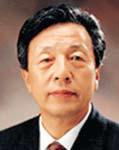 36 (22) Han Chang-Woo
36 (22) Han Chang-Woo
Chairman and CEO
Maruhan Group
Under the leadership of Han Chang-Woo, Maruhan Corp has diversified from its core operation as a Japanese pachinko parlour operator and now has a range of investments, including an indirect stake in a Macau casino gaming resort.
The latter is via Maruhan’s 18% stake in Success Universe Group, a joint partner with Dr Stanley Ho’s SJM in the Ponte 16 casino resort at Macau’s historic Inner Harbour. Maruhan is likely within three years to have indirect investment exposure to a second Macau casino on Cotai. That’s if, as expected, the six-star hotel in the One Oasis residential project goes ahead. Success Universe Group is one of the partners in the One Oasis consortium.
Despite some analysts suggesting the appeal of pachinko is diminishing among the younger generation of Japanese, Maruhan actually increased its coverage of the domestic market in the past 12 months, adding 14 new pachinko parlours to its inventory, taking the total to 258 as of the fiscal year ending 31st March. It also owns 13 other leisure centres, including bowling alleys, and employs 12,899 people—a 3% increase on 2009. The corporation also owns a bank— Maruhan Japan Bank Plc—licensed for commercial banking operations in Cambodia.
Maruhan Corp recorded ¥55.4 billion (US$650 million) profit on sales of ¥2.12 trillion (US$2 billion) in the fiscal year to March. Maruhan, a mature business set up in 1953 and incorporated in 1957, might also seek to diversify in its home market by investing in domestic casino gaming if legalisation of the industry ever goes ahead in Japan.
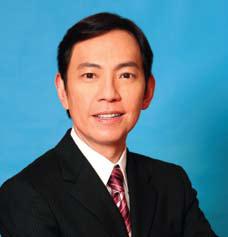 37 (37) Sonny Yeung Hoi-sing
37 (37) Sonny Yeung Hoi-sing
Chairman
Success Universe Group Ltd
Mr Yeung has had a busy 12 months since the 2009 edition of the Asian Gaming 50. He made world headlines for his successful (and extremely inflated) bid for the white rhinestone covered glove worn by the late singer Michael Jackson when the latter debuted his signature moonwalk move in 1983 as he performed the hit single ‘Billie Jean.’
The glove is now displayed along with other Michael Jackson memorabilia collected by Mr Yeung at Ponte 16, a Macau casino resort in which Mr Yeung’s company Success Universe Group is a 50:50 joint venture partner with Dr Stanley Ho’s SJM.
Mr Yeung’s formative gaming industry experience was as a VIP room operator at Dr Ho’s Casino Lisboa. The relationship forged during that time paid dividends when he was able to broker the investment deal for Ponte 16, where the gaming rooms also operate under an SJM gaming licence.
Ponte 16 has attracted plenty of mass market players from the neighbouring mainland Chinese city of Zhuhai, but has struggled for market visibility and distinctiveness in an increasingly crowded Macau casino industry. The proposition on which Ponte 16 was built—that it is the nearest casino to Macau’s historic and UNESCO World Heritage-listed old town— in practice seemed to give it little market advantage. Few of the tourists coming to see the old town seem to be especially interested in casino gambling, and few of the tourists who come for casino gambling seem especially interested in looking at colonial era churches, squares and theatres.
As a result, Ponte 16’s accompanying hotel, under the Sofitel brand, initially struggled for market share among Macau’s overnight visitors, though is now performing well. Downstairs, the mass market casino floor at Ponte 16 is packing in local players from Macau and neighbouring Zhuhai in China—the property is accessible from Zhuhai either directly via a five-minute ferry ride across the Inner Harbour, or a short bus ride from the Gongbei land border. But Ponte 16 continues to be under represented in the vital VIP market that provides the majority of Macau’s gaming revenues. Only around 10 of its 100 tables are for high rollers.
Ponte 16 had a very modest capex by modern Macau standards—HK$2.4 billion (US$310 million at current exchange rates)—but has also been a sluggish earner by Macau standards, continuing to post significant operating losses nearly two and a half years later. As of 25th June this year, Success Universe Group had outstanding shareholder loans to Ponte 16 of HK$825.9 million (US$106.3 million), according to a filing made to Hong Kong Exchanges and Clearing Limited. Success Universe Group Ltd (formerly Macau Success) also runs a casino cruise ship, the M.V. Macau Success, out of Tsim Sha Tsui in Hong Kong.
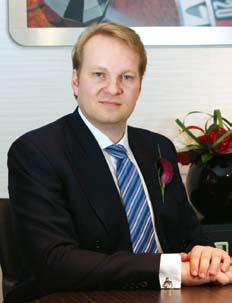 38 (46) Tristan Sjöberg
38 (46) Tristan Sjöberg
Managing Director Asia
TCSJOHNHUXLEY
TCSJOHNHUXLEY scored major sales success this year in Singapore, including an order for more than 100 Novo Unity™ II TouchBet® Roulette terminals at Resorts World Sentosa (RWS), the first of the city state’s two integrated gaming resorts to open.
Genting, the operator of RWS, had previously installed Novo TouchBet Roulette at Resorts World Genting, its casino property in neighbouring Malaysia.
Tristan Sjöberg, Managing Director Asia for TCSJOHNHUXLEY, masterminded the groundwork for the Singapore sales success by identifying the need to set up a sales and support operation in the city well in advance, rather than trying to manage the project remotely from Macau, the region’s other major market. That decision to localise the operation in Singapore in turn ensured the company and its products were well placed to satisfy the exacting technical requirements of the local gaming regulator, the Casino Regulatory Authority.
The TouchBet terminals at RWS have reportedly seen 100% occupancy since the resort opened in February. TCSJOHNHUXLEY attributes some of that success to TouchBet’s configuration as a single player terminal, creating a relaxed environment for new and experienced players alike, thus significantly increasing time on machine.
Mr Sjöberg has a PhD in oceanography, so a career in gaming was not the most obvious choice of direction. The fact, however, that oceanography deals with analysis of highly complex systems probably set him in good stead when he moved into the electronic gaming equipment market.
 39 (39) Gregory S. Gronau
39 (39) Gregory S. Gronau
Chief Executive Officer
Gaming Partners International Corporation
In August, Gaming Partners International (GPI) announced an alliance with International Game Technology (IGT) on gaming chip know-how that could influence the future performance of both companies in this segment for some years to come. The tie up could also play a major role in defining the legacy of Gregory S. Gronau as CEO of GPI.
GPI, a manufacturer and supplier of— among other things—radio frequency identification (RFID) chips for casinos, entered into a technology licence and transfer deal with IGT. It allows GPI to develop, manufacture, and distribute IGT’s high-frequency RFID products and systems worldwide. IGT acquired the basis of that high frequency technology when it took over the intellectual property of Progressive Gaming International (PGI) in January 2009.
PGI’s system was widely trailed as a significant breakthrough in high frequency RFID chip tracking, but glitches in implementing the system limited its impact on the market. The GPI-IGT alliance could be the breakthrough the technology needs.
“Our leadership in gaming currency and RFID products makes GPI the logical choice for unifying these technologies,” Mr Gronau said of the deal.
GPI also manufactures and supplies table layouts, playing cards, table accessories, gaming furniture, dice roulette wheels, and casino chips under the brands Paulson, Bourgogne et Grasset, and Bud Jones to casinos all over the world. GPI is based in Las Vegas, with offices in other markets including Atlantic City, Mexico, and France.
GPI is not only one of the longest-serving equipment providers to the Macau market, with a 43-year track record, but it is also one of the most dominant, currently claiming a market share of around 90%.
Mr Gronau joined GPI in October 2008 as Chief Operating Officer. From 2002 to 2006, he served as Vice President of Operations for Shuffle Master Inc., a major supplier of automatic card shufflers and proprietary table games.
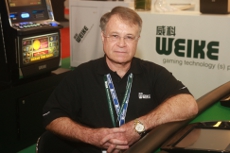 40 (41) David Kinsman
40 (41) David Kinsman
CEO
Weike Gaming Technology
Under David Kinsman’s leadership, Singapore-based Weike made a major commercial breakthrough in April. The company was accepted as an Approved Manufacturer and Approved Supplier of gaming machines and gaming equipment by Singapore’s Casino Regulatory Authority (CRA) after Weike’s senior personnel passed all the rigorous technical competence and personal probity checks required by the Authority.
That month, the CRA also approved the Weike Infinity gaming machine together with a series of Weike’s 25-lines and 50- lines slot games for use in Marina Bay Sands and Resorts World Sentosa. The company now joins a small group of international manufacturers that are licensed in Singapore to supply those two newly authorised casinos. Given that Singapore is known to have one of the most exacting gaming regulatory regimes in the world, the approvals could open doors for Weike’s products in markets far beyond Singapore’s borders.
The company is also expanding rapidly in Macau. Weike’s The Club at Kam Pek, inside one of Macau’s SJM-licensed legacy casinos, will have an extra 105 machines installed in November. And also that month, Weike will open another club with 200 machines at a different site, moving the company half way toward its target of having 1,000 machines operational in Macau by the end of 2011. Weike will soon have product in South Korea for the first time, and is installing the company’s first Pal X Poker tables in Star City casino in Sydney in coming months.
Mr Kinsman is a passionate advocate of multiplayer electronic table game products, not only as an antidote for operators to rising labour costs in the Asian casino gaming markets, but also for the benefit of players by providing them the true odds and correct payout for every game and every hand played. The company has also been building its gaming systems business in Asia, including slot management, customer relationship management and monitoring systems.
Mr Kinsman started his gaming career with Olympic Video Gaming in Australia, which became Australasia’s No. 2 manufacturer under his leadership. The company was eventually sold to IGT Group in 1997 for A$178 million (US$152.8 million at today’s prices). Mr Kinsman also served as General Manager of Vidco, launching multiterminal gaming products. Vidco was then sold to another group and renamed as Star Games in 1991.
His next role was as CEO of Online Gaming Systems in Australia, where he set up the regional office in Sydney to service the Australian, Asia-Pacific and South African markets. Later, the company took over the worldwide assets of its then parent.
Between 1994 and 1998, he served twice as Director of AGMMA, the Australian Gaming Machine Manufacturers’ Association (now known as the Gaming Technologies Association).
In 2004, Mr Kinsman was headhunted by the online gaming provider Mansion Group as COO, creating ‘The Poker Dome’, a television series featuring poker games between the world’s top players betting their own money. It became one of the top-rated shows on the Fox Network in the United States and beyond, generating a large pool of clients for Mansion.






















